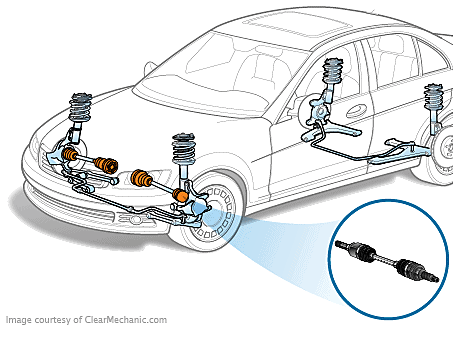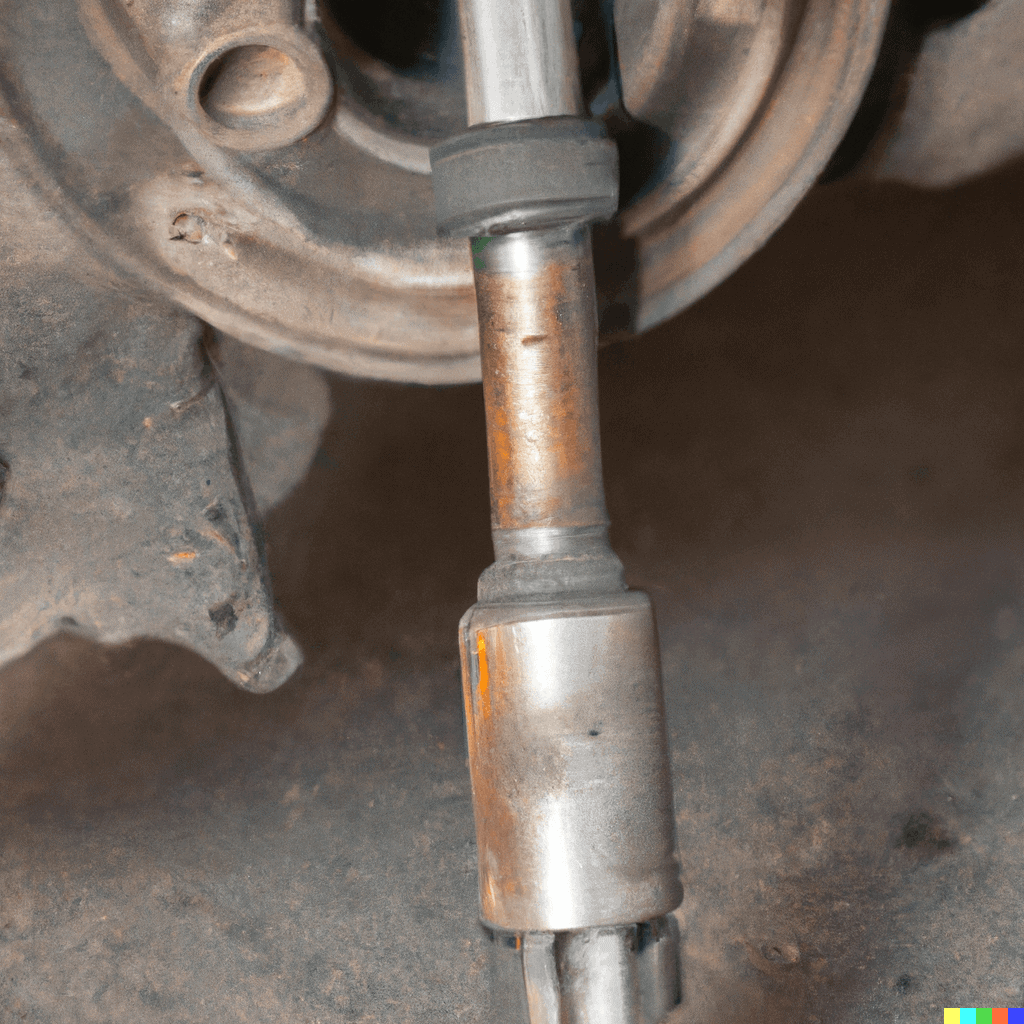Are you experiencing a vibration or clicking noise when turning your car? It could be a sign of a faulty CV axle shaft. Here’s what you need to know about this critical component of your car’s drivetrain.

What is a CV Axle Shaft?
A CV axle shaft, also known as a half-shaft or constant velocity axle, is responsible for transferring power from the transmission to the wheels. It allows the wheels to turn while the suspension moves up and down.
How Much Does it Cost to Replace a CV Axle Shaft in Canada?
The cost of replacing a CV axle shaft in Canada can vary depending on the make and model of your vehicle, as well as the location of the repair shop. On average, the cost can range from $300 to $800.
The cost breakdown for CV axle shaft replacement includes parts and labor. The part cost for a CV axle shaft can range from $100 to $400, depending on the make and model of your vehicle. Labor costs can range from $150 to $400, depending on the amount of time it takes to complete the repair and the hourly rate of the repair shop.
The time it takes to complete the replacement of a CV axle shaft can vary depending on the make and model of your vehicle and the level of damage to the existing component. On average, it can take between 1-2 hours to replace a single CV axle shaft. However, if the CV axle shaft has caused damage to other components, it may take longer to complete the repair.
It’s important to note that these are only estimates, and the actual cost and time of replacing a CV axle shaft can vary depending on several factors. It’s best to get a detailed quote from a trusted repair shop before proceeding with the repair.
What are the Symptoms of a Faulty CV Axle Shaft?
• Clicking or Popping Noises: A clicking or popping noise when turning is a common sign of a faulty CV axle shaft. The noise may increase as you accelerate or turn.
• Vibrations While Driving: If you notice vibrations or shaking while driving, especially at higher speeds, it could be a sign of a faulty CV axle shaft.
• Grease on the Inside of the Wheel: If you notice grease on the inside of the wheel, it could be a sign of a torn or damaged CV axle boot, which can lead to CV joint failure.
• Shaking or Wobbling at High Speeds: A faulty CV axle shaft can cause shaking or wobbling at high speeds, especially during acceleration or when turning.
How Often Does a CV Axle Shaft Need to be Replaced?
A CV axle shaft can last up to 100,000 km or more with proper maintenance. However, if you notice any symptoms of a faulty CV axle shaft, it’s crucial to get it checked and replaced as soon as possible.
How does a CV Axle Shaft Become Defective?
A CV axle shaft can become defective due to a variety of reasons, including wear and tear, damage to the CV joint, or lack of lubrication. Here are some common causes of CV axle shaft failure:
1. Age and Wear: Over time, the constant movement of the CV joint and axle shaft can cause the joint to wear down and become damaged. This wear can lead to a loss of lubrication and eventually cause the joint to fail.
2. Lack of Maintenance: Regular maintenance of the CV axle shaft, including the CV joint boot, is critical to preventing damage and prolonging its lifespan. If the boot becomes torn or cracked, it can allow dirt and debris to enter the joint, leading to premature wear and damage.
3. Damage: Impact from a collision or hitting a large pothole can cause damage to the CV axle shaft or joint, leading to failure.
4. Extreme Conditions: Extreme temperatures, such as heat or cold, can cause the CV joint and axle shaft to expand or contract, leading to damage over time.
It’s important to note that even with proper maintenance, a CV axle shaft can still fail due to these factors.
How a Faulty CV Axle Shaft Can Affect other Systems in the Car?
A faulty CV axle shaft can affect other systems in your car’s drivetrain, leading to potential damage and safety concerns. Here are some ways a faulty CV axle shaft can affect other systems in your car:
1. Transmission: The CV axle shaft is responsible for transferring power from the transmission to the wheels. If the CV axle shaft is faulty, it can cause additional stress and strain on the transmission, potentially leading to damage and costly repairs.
2. Differential: The differential allows the wheels to turn at different speeds, which is necessary for turning and cornering. A faulty CV axle shaft can cause the differential to work harder, leading to potential damage and increased wear and tear.
3. Wheel Bearings: The CV axle shaft is connected to the wheel bearings, and a faulty CV axle shaft can cause additional stress on the bearings, leading to potential damage and failure.
4. Suspension: The CV axle shaft is connected to the suspension system, which allows the wheels to move up and down while driving. A faulty CV axle shaft can cause additional stress on the suspension system, leading to potential damage and safety concerns.
5. Steering: The CV axle shaft is essential for turning and steering your vehicle. A faulty CV axle shaft can cause vibrations and shaking while turning, potentially leading to difficulty steering and loss of control.
It’s crucial to address a faulty CV axle shaft promptly to prevent further damage and potential safety concerns.

Is it Safe to Drive with a Faulty CV Axle Shaft?
Driving with a faulty CV axle shaft is not safe and can lead to potential safety concerns while on the road. Here are some reasons why it’s not safe to drive with a faulty CV axle shaft:
1. Loss of Control: A faulty CV axle shaft can cause vibrations and shaking while driving, leading to potential difficulty controlling your vehicle and loss of control.
2. Potential for Accident: If the CV axle shaft fails while driving, it can cause a sudden loss of power to the wheels, potentially causing an accident.
3. Additional Damage: A faulty CV axle shaft can cause additional stress and strain on other components in your car’s drivetrain, potentially leading to additional damage and costly repairs.
4. Unpredictable Handling: A faulty CV axle shaft can cause unpredictable handling and shaking while driving, making it difficult to control your vehicle on the road.
If you notice any symptoms of a faulty CV axle shaft, such as clicking or popping noises, vibrations while driving, or grease on the inside of the wheel, it’s crucial to get it checked and replaced as soon as possible to ensure your safety on the road. Driving with a faulty CV axle shaft can cause additional damage and safety concerns, and it’s not recommended to continue driving until the component has been repaired or replaced.
How To Make a CV Axle Shaft Last longer?
• Regularly inspect and maintain the CV axle boots and joints
• Avoid rough driving and sudden stops
• Keep the wheels aligned and balanced
• Use high-quality lubricants and fluids
Conclusion
The CV axle shaft is a crucial component of your car’s drivetrain, responsible for transferring power from the transmission to the wheels. If you notice any symptoms of a faulty CV axle shaft, it’s crucial to get it checked and replaced as soon as possible to prevent further damage and ensure your safety on the road. With proper maintenance and care, you can extend the lifespan of your CV axle shaft and avoid costly repairs in the future.
